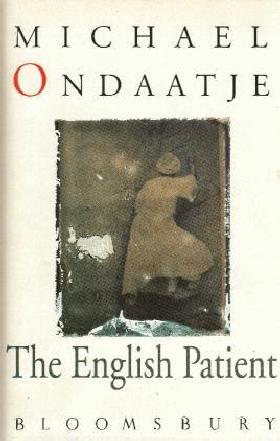
Michael Ondaatje
The following novels constitute the shortlist for the 1992 Booker Prize:
The judges for the 1992 Booker prize were: Victoria Glendinning; John Coldstream; Valentine Cunningham; Dr Harriet Harvey Wood; and Mark Lawson.
Notable Omissions from the 1992 Shortlist

|
The English Patient Michael Ondaatje |
Dustjacket synopsis:
"Michael Ondaatje's stunning new novel takes place as the Second World War is ending. It explores
the lives of four people, a young woman and three men, who are stranded in a damaged villa north
of Florence as the war retreats around them. In an upstairs room lies the badly burned English
patient, alive but unable to move. His extraordinary adventures and turbulent love affair in the
North African desert before the War provide the focus around which the vivid tales of his
companions revolve.
"This is a breathtaking story of love and passion that twists through London's Blitz and the intricacies of bomb disposal, through the mysterious, often dangerous world of desert exploration. Michael Ondaatje brings his formidable poetic and narrative powers to bear on the destiny of his four characters. In prose that soars he reveals the complex impact of public conflict on private lives. As full of resonances as a dream, The English Patient will stand as Ondaatje's finest work to date."
First Paragraph:
She stands up in the garden where she has been working and looks into the distance. She has sensed a shift in the weather. There is another gust of wind, a buckle of noise in the air, and the tall cypresses sway. She turns and moves uphill towards the house, climbing over a low wall, feeling the first drops of rain on her bare arms. She crosses the loggia and quickly enters the house.
In the kitchen she doesn't pause but goes through it and climbs the stairs which are in darkness and then continues along the long hall, at the end of which is a wedge of light from an open door.
She turns into the room which is another garden - this one made up of trees and bowers painted over its walls and ceiling. The man lies on the bed, his body exposed to the breeze, and he turns his head slowly towards her as she enters.
From the Bloomsbury hardback edition, 1992.
Notes:
In 1996 a film adaptation of this novel was released. The film was directed by Anthony Minghella,
and featured Ralph Fiennes, Juliette Binoche, Willem Dafoe, and Kirsten Scott Thomas. It won
nine Academy Awards and was nominated in a further 3 categories.
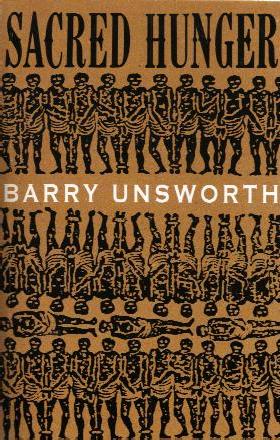
|
Sacred Hunger Barry Unsworth |
Dustjacket synopsis:
"SACRED HUNGER is Barry Unsworth's finest novel yet. Powerful and wide-reaching in scope,
it is a classic exploration of moral choices and men's behaviour in extremis.
"It is 1752, a time of expanding opportunities and quick profit. But the what place is there for business ethics when the commodity in question is human beings? On a wave of optimism the Liverpool Merchant sets sail, her owner greedily anticipating the easy money to be had from the trade in African slaves. But once the trading is over, disease spreads quickly through the cramped cargo, taking the profits with it. Just as dangerously the crew is riven by malaise and dark speculations which bring their own bloody consequences.
"The novel tells of the bitterness between two cousins whose destinies are consumed by the fate of the Liverpool Merchant. Defying any easy conclusions, this is an extraordinary novel about poverty of spirit and the richness of hope."
First Paragraph:
According to Charles Townsend Mather, the mulatto was dark amber in colour and grey-haired and nearly blind. He was small-boned and delicately made and he had a way of tilting his head up when he spoke, as if seeking to admit more light to the curdled crystals of his eyes. He was an old plantation slave from Carolina, freed when he was past work and turned off the land. In the spring and the summer of 1832 he was begging every day in the streets of New Orleans and down on the waterfront. He would wait on the quayside for paid-off sailors, to whom some clouded impulse of pity or contempt might come. He was a talker; whether there was anyone to hear or not, he went on muttering or shouting the details of his life.
From the Hamish Hamilton paperback edition, 1992.
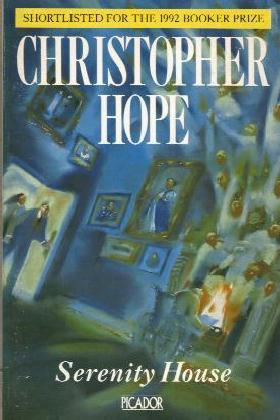
|
Serenity House Christopher Hope |
Dustjacket synopsis:
"Max Montfalcon lay in bed and tried to remember how many people he had killed.
"Old Max, the genial giant of Serenity House, north London's 'Premier Eventide refuge', might have been left to die in peace. But his son-in-law Albert, an MP with a special interest in the War Crimes Bill, has other ideas. Then Jack arrives. An all-American boy who survives on a diet of video nasties and Chinese takeaways. Max is haunted by dreams of the holocaust. And the occupants of Serenity House are haunted by Jack..."
Quotes:
"The subject could hardly be more sombre, but Hope provides laughter in the dark as he
describes Max's fitfully convenient amnesia. It is the Nazi horror-show retold by the
Brothers Grimm" - Sunday Times
"Brilliantly constructed and paced, with not a word to spare or a scene which does not move
the narrative forward...only the very innocent escape his scathing wit" - Literary Review
"Superb...Hope employs a blend of devasting satire and gruesome humour to counterpoint the
banal with the fantastic, and does so to dazzling effect" - Independent
First Paragraph:
Max Montfalcon lay in bed and tried to remember how many people he had killed. If one understood the question correctly, it seemed very much a question of number.
Beside him, exuding heat and steam, a moistness almost palpable, a damp gust from some peculiar English tropic, he could feel the perspiring presence of Albert, his interrogator. That long ago a fat young man should have stolen one's daughter and become one's son-in-law was bad enough. It was pretty bloody rum when one's son-in-law turned interrogator. Max's eyes were closed and he liked them that way. He heard the distant church clock strike seven, the chimes carrying a mile or more in the evening air. By such sonic rituals Max had marked out his days and nights at Serenity House since that day in early Novemebr 1990, when he had gone 'inside'. The church clock clear at seven of an evening. The call for 'lights out' at nine. The electric milk van at dawn. In summer the boys at the prep school across the road were in the cricket nets. In winter their voices grew shriller. Leaping and darting like midges they batted the hard ball back and forth across the fives courts. Roofless concrete sheds lit by fierce electric lamps. Leather glove meatly as it struck the ball; the scramble for the pepper. Eton Fives on a winter evening. Thank God for England!
From the Picador paperback edition, 1993.
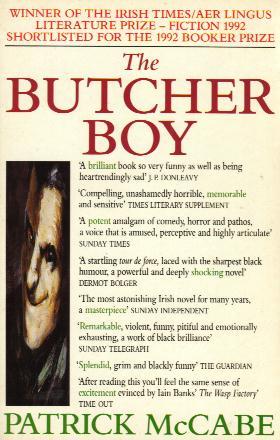
|
The Butcher Boy Patrick McCabe |
Dustjacket synopsis:
"Welcome to the frightening world of Francis Brady...
"And standing full and stark in the glare of the lights, Francie Brady, or perhaps the Pig Boy to you, friend of Joe Purcell, and sole student of the Francis Brady Not A Bad Bastard Any More diploma.
"It's no easy task when your family's dead and Joe is no longer your friend, when everyone turns their back on you and leaves you barrowing offal around town, all the while laughing, singing a song about how it was your ma died on account of you.
"How would you react?
"Leave the source of your troubles untouched, still trying for that elusive diploma, trying not to be a bad bastard any more, when all you want is your friend back and everything to be as it was in the good old days?
"Patrick McCabe has written a mesmeric tale of horror and pathos, and created a jagged world of scorn and fear, of turned backs and spoken insults, a world to which it is impossible to belong unless you know the rules."
Quotes:
"A brilliant book so very funny as well as being heartrendingly sad." - J.P. Donleavy
"Compelling, unashamedly horrible, memorable and sensitive" - Times Literary Supplement
"A potent amalgam of comedy, horror, pathos, a voice that is amused, perceptive and
highly articulate" - Sunday Times
"A startling tour de force, laced with the sharpest black humour, a powerful and
deeply shocking novel" - Dermot Bolger
"The most astonishing Irish novel for many years, a masterpiece" - Sunday Independent
"Remarkable, violent, funny, pitiful and emotionally exhausting, a work of black brilliance" -
Sunday Telegraph
"Splendid, grim and blackly funny" - The Guardian
"After reading this you'll feel the same sense of excitement evinced by Iain Banks'
The Wasp Factory" - Time Out
First Paragraph:
When I was a lad twenty or thirty or forty years ago I lived in a small town where they were all after me on account of what I done on Mrs Nugent. I was hiding out by the river in a hole under a tangle of briars. It was a hide me and Joe made. Death to all dogs who enter here, we said. Except us of course.
You could see plenty from the inside but no one could see you. Weeds and driftwood and everything floating downstream undre the dark archway of the bridge. Sailing away to Timbuctoo. Good luck now weeds, I said.
From the Picador paperback edition, 1992.
Notes:
McCabe adapted his novel for the theatre under the title "Frank Pig Says Hello".
Neil Jordan (of "The Crying Game" fame) has released a film version of the novel. It was scripted
by Jordan and McCabe and featured Stephen Rea, Fiona Shaw, Eamonn Owens and Sinéad O'Connor.
Besides being nominated for the Booker Prize, The Butcher Boy was nominated for the 1995
Stoker Award which is presented by the Horror Writers Association. Given the year I suspect
this represents first publication in the US in 1994.
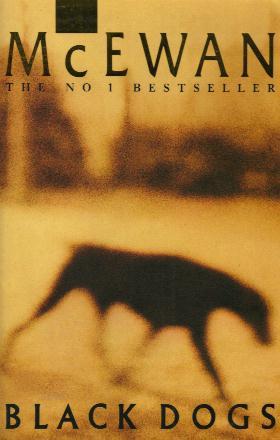
|
Black Dogs Ian McEwan |
Quotes:
"I judge it his best yet, which I should make clear is saying a great deal" - Andrew Billen, Observer
"Black Dogs is a complex statement about violence, that 'disease of the human
imagination'. It is compassionate without resorting to sentimentality, clever without
ever losing its honesty, an undisguised novel of ideas which is also Ian McEwan's most
human work." - Times Literary Supplement
"Black Dogs is built around a brilliant short story, a mesmerically
slow-motion encounter with two terrifying dogs by an English coupe who are honeymooning
just after the war in a French mountain village." - Evening Standard
"In
"This is his best book...it does not have one boring thought in it, much less a bad sentence.
It would be worth reading for the beauty and clarity of the writing alone." - Cressida Connolly, Tatler
First Paragraph:
Ever since I lost mine in a road accident when I was eight, I have had my eye on other people's parents. This was particularly true during my teens when many of my friends were casting off their own folk, and I did rather well in a lonely, hand-me-down way. In our neighbourhood there was no shortage of faintly dejected fathers and mothers only too happy to have at least one seventeen-year-old around to appreciate their jokes, advice, cooking, even their money. At the same time I was something of a parent myself. My immediate mileau in those days was the new and distintegrating marriage of my sister Jean to a man called Harper. My protegee and intimate in this unhappy household was my three-year-old niece, Sally, Jean's only child. The rages and reconciliations that surged up and down the big apartment - Jean had inherited half the estate; my half was held in trust - tended to sweep Sally aside. Naturally, I identified with an abandoned child and so we holed up nicely from time to time in a large room overlooking the garden with her toys and my records, and a tiny kitchen we used whenever the savagery beyond made us not want to show our faces.
From the Picador paperback edition, 1993.
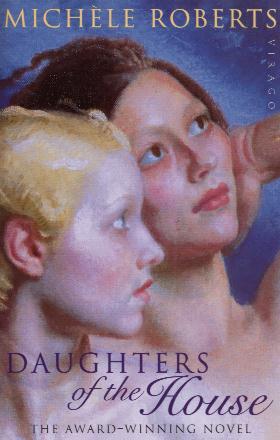
|
Daughters of the House Michèle Roberts |
Dustjacket synopsis:
"Secrets and lies linger in the very walls of the solid, old Normandy house in which
Therese and Leonie, French and English cousins of the same age, grow up after the war.
Intrigued by parents' and servants' guilty silences and the broken shrine they find buried in
the woods, the girls weave their own elaborate fantasies, unwittingly revealing the village
secret and a deep shame that will come to haunt them in their adult lives."
Quotes:
"Remarkable and beautifully written"- Hermoine Lee, Independent on Sunday
"A brave and richly imagined novel, full of thrilling set-pieces...one of
our best writers" - Jonathan Coe, Guardian
"Utterly beguiling" - Joanna Trollope
"Subtle and persuasive" - Cosmopolitan
First Paragraph:
It was a changeable house. Sometimes it felt safe as a church, and sometimes it shivered and then cracked apart.
A sloping blue slate roof held it down. Turrets at the four corners wore pointed blue hats. The many eyes of the house were blinded by white shutters.
What bounded the house was skin. A wall of gristle a soldier could tear open with his bare hands. Antionette laughed. She was buried in the cellar under a heap of sand. Her mouth was stuffed full of torn-up letters and broken glass but she was tunnelling her way out like a mole. Her mouth bled from the corners. She laughed a guttural laugh, a Nazi laugh.
The house was strict. The rules indicated the forbidden places. Chief of these was the bedroom at the back on the first floor, at the top of the kitchen stairs.
The rules said you musn't go there. It was for your own protection. Each time Léonie tried she had to halt. The terror was so strong. It pushed her away, wouldn't let her come near. Behind the terror was something evil which stank and wanted to fix her in its embrace. Better to flee, to clatter back across the bare plank floor of the landing, find the headlong stairs and fall down them. Better to stay at the front of the house.
From the Virago paperback edition, 1997.
Notes:
This novel also won the WH Smith Literary Award.
Notable Omissions from the Shortlist:
"Death and Nightmares", Eugene McCabe
"Of Love and Asthma", Ferdinand Mount (winner of the 1992 Hawthornden Prize)
"Cloudstreet", Tim Winton (winner of the 1992 Miles Franklin Award)
This page and its contents are copyright © 2002 by Perry Middlemiss, Melbourne, Victoria, Australia.
Last modified: April 6, 2002.